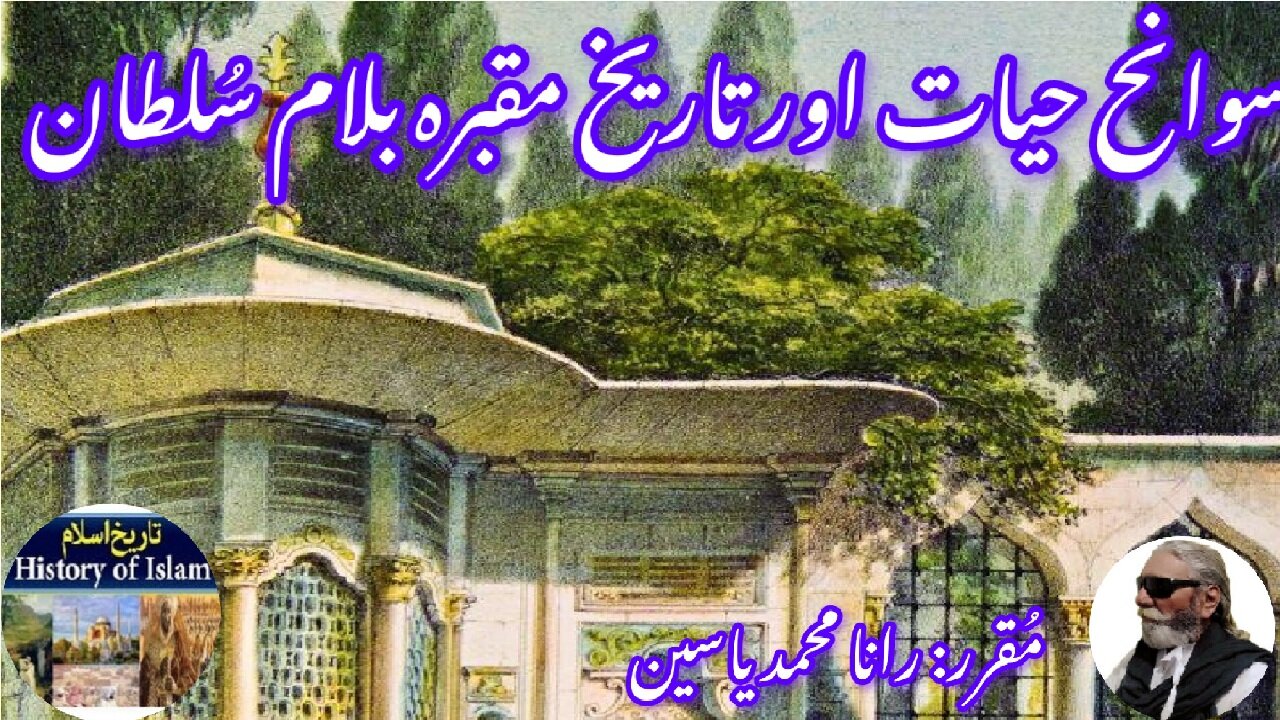Premium Only Content

Balam Sultan बलम सुल्तान اسلامی اسکالر بلام سلطان کی سوانح حیات اور ان کے مزار کی تاریخ
@islamichistory813 #sufisaint #culturalheritage #shrine #islamicmysticism #islamicphilosophy #shrine #historicalfigures
#balamsultan
Biography of Islamic Scholar Balam Sultan and the history of his shrine
Dekhti Aankhooon aur sountay kaanoon ko Asslamoalaikum, Assalamu Alaikum, sisters, brothers and elders, today in the informative videos of the holiest places of Islam, Islamic Sufi elders, scholars, we are describing the biography of Balam Sultan and the history of his shrine.
Balam Sultan, an influential Islamic scholar and mystic, is recognized as one of the key figures in the establishment of the Bektashi Order, a prominent Sufi order in Turkey and the Balkans. He was born in the late 15th century, around the year 1450, in the region of Anatolia, which is now part of modern-day Turkey. The exact location of his birth is often debated, with some sources suggesting that he hailed from the town of Kütahya. During this time, Anatolia was a melting pot of various cultural and religious influences, including Islamic, Byzantine, and indigenous traditions. This rich tapestry of beliefs and practices would significantly shape Balam Sultan's spiritual journey.
From a young age, Bal?m Sultan demonstrated an exceptional intellect and a profound interest in religious studies. His family background, likely rooted in the religious community, encouraged his pursuit of knowledge. He was drawn to the teachings of Sufism, which offered a more personal and experiential approach to spirituality. As he matured, he sought education under esteemed scholars and Sufi masters, immersing himself in the study of the Quran, Hadith, Islamic jurisprudence, and mystical literature.
Bal?m Sultan's early life was marked by a quest for deeper understanding and connection with the Divine. He traveled extensively to various centers of learning, including Konya, a city renowned for its Sufi heritage and the teachings of Rumi, as well as other significant locales in the Islamic world. These journeys enriched his spiritual education and exposed him to diverse Sufi practices and philosophies. Through these experiences, he developed a unique perspective that would later inform his own teachings and the principles of the Bektashi Order.
Bal?m Sultan's formal education involved rigorous studies under the guidance of esteemed scholars of his time. He dedicated himself to mastering the religious sciences, focusing on the Quran and its interpretations, the Hadith, and various branches of Islamic jurisprudence. His commitment to learning was not limited to traditional texts; he also explored Sufi literature, engaging with the writings of prominent Sufi thinkers. This blend of knowledge fostered his spiritual development and shaped his understanding of the relationship between the individual and the Divine.
As he delved into Sufism, Bal?m Sultan became increasingly interested in the concept of direct experience of God. He was particularly drawn to the teachings of earlier Sufi masters who emphasized the importance of inner purification, love, and devotion. This exploration led him to seek the guidance of established Sufi leaders, eventually leading him to become a disciple of Haji Bektash Veli, the founder of the Bektashi Order.
Under the tutelage of Haji Bektash, Bal?m Sultan deepened his understanding of the Sufi path. He learned about the significance of dhikr (remembrance of God), the importance of community, and the need for ethical conduct in spiritual practice. These teachings resonated with Bal?m Sultan, who began to articulate his own vision for a spiritual community that would embody these principles.
In the late 15th century, Bal?m Sultan emerged as a prominent figure within the Bektashi Order. Alongside Haji Bektash Veli, he played a crucial role in establishing the order as a formal Sufi community. The Bektashi Order distinguished itself from other Sufi orders through its unique blend of Islamic teachings and folk traditions, emphasizing inclusivity, tolerance, and social justice. Bal?m Sultan's contributions were instrumental in shaping the order's doctrines, practices, and communal identity.
One of the defining features of the Bektashi Order is its egalitarian approach to spirituality. Bal?m Sultan advocated for a form of Sufism that transcended class and social distinctions, emphasizing the universal nature of spiritual experience. He believed that anyone, regardless of their background, could embark on the path to the Divine. This inclusive philosophy attracted a diverse following, including peasants, artisans, and members of the Ottoman elite, who found solace and guidance in the teachings of the order.
The Bektashi Order also placed a strong emphasis on the importance of human relationships and community. Bal?m Sultan encouraged his followers to cultivate a sense of brotherhood and solidarity, promoting the idea that spiritual development is best achieved in the context of supportive relationships. This focus on community was particularly important during a time when the Ottoman Empire was expanding, and various cultural influences were converging in Anatolia.
Bal?m Sultan's teachings emphasized the significance of inner transformation and ethical conduct in the spiritual journey. He advocated for a lifestyle rooted in love, compassion, and service to others, urging his followers to embody these values in their daily lives. This holistic approach to spirituality resonated with many, further solidifying the Bektashi Order's influence and appeal.
Bal?m Sultan passed away around 1517 or 1519, leaving behind a rich legacy that would continue to shape the Bektashi Order and its followers for generations to come. His death marked a significant moment in the history of the order, as he was regarded as one of its co-founders and a pivotal figure in the development of its doctrines and practices. Following his passing, Bal?m Sultan was buried in the Nev?ehir Province of Turkey, a region that would become an important center for Bektashi spirituality.
The site of Bal?m Sultan's tomb has since become a significant pilgrimage destination for followers of the Bektashi Order and other Sufi practitioners. The mausoleum, a simple yet elegant structure, reflects the values of humility and devotion that Bal?m Sultan embodied throughout his life. It serves as a place of reflection, remembrance, and spiritual connection for those who visit, providing an opportunity for individuals to seek inspiration from his teachings and legacy.
Bal?m Sultan's impact on the Bektashi Order is profound and far-reaching. His teachings continue to resonate within the order, influencing its practices, rituals, and community dynamics. The principles of inclusivity, love, and ethical conduct that he championed remain central tenets of Bektashi spirituality, guiding followers in their pursuit of a deeper connection with the Divine.
In the years following his death, the Bektashi Order continued to grow and evolve, spreading its influence across the Ottoman Empire and beyond. The teachings of Bal?m Sultan, along with those of other key figures within the order, contributed to its adaptability and relevance in various cultural contexts. The order's emphasis on tolerance and acceptance allowed it to thrive in diverse environments, fostering a sense of unity among its followers.
The legacy of Bal?m Sultan extends beyond the confines of the Bektashi Order, as his teachings have had a profound impact on Turkish and Balkan culture. The order’s emphasis on social justice, compassion, and community service has inspired countless individuals to engage in acts of kindness and support for those in need. This commitment to social responsibility is reflected in various aspects of daily life within Bektashi communities.
Bal?m Sultan's teachings have also found expression in the arts, literature, and folklore of the regions where the Bektashi Order flourished. The order's unique blend of Islamic spirituality and folk traditions has produced a rich tapestry of cultural expressions, including poetry, music, and dance. These artistic forms often draw upon themes of love, devotion, and the search for divine truth, echoing the spiritual journey that Bal?m Sultan advocated.
The Bektashi Order's inclusive approach to spirituality has made it a significant force in promoting dialogue and understanding among different religious and cultural communities. The order's leaders have historically played important roles in fostering interfaith relations, advocating for tolerance, and promoting coexistence in diverse societies. Bal?m Sultan's legacy as a proponent of love and acceptance continues to inspire efforts towards building bridges between communities.
The tomb of Bal?m Sultan in Nev?ehir Province has become a focal point for Bektashi followers and spiritual seekers. The shrine, constructed by his followers after his passing, stands as a testament to his enduring influence and the love and respect his community held for him. Over the centuries, the shrine has been maintained and adorned, reflecting the veneration of Bal?m Sultan and the principles he espoused.
The site attracts pilgrims and visitors from various backgrounds, who come to pay their respects, seek blessings, and engage in spiritual practices. Rituals performed at the shrine often include prayers, recitations of poetry, and gatherings for communal reflection on the teachings of Bal?m Sultan. The shrine serves as a space for both remembrance and community, fostering a sense of belonging among those who visit.
Annual commemorations are held at the shrine to honor Bal?m Sultan's life and legacy. These events bring together followers of the Bektashi Order, as well as individuals from other spiritual traditions, creating a vibrant atmosphere of celebration and reflection. Participants share stories, engage in discussions about spirituality, and participate in rituals that honor Bal?m Sultan's contributions to Sufism and community life.
In recent years, the shrine has also become a site for cultural events, workshops, and educational programs aimed at promoting the values of the Bektashi Order and fostering dialogue among diverse communities. These initiatives reflect the order's commitment to social responsibility and its desire to engage with contemporary issues in society.
Bal?m Sultan's life and teachings represent a significant chapter in the history of Sufism and the Bektashi Order. His commitment to inclusivity, love, and ethical conduct has left an indelible mark on the spiritual landscape of Turkey and the Balkans. The legacy of Bal?m Sultan continues to inspire individuals on their spiritual journeys, reminding them of the importance of community, compassion, and the pursuit of divine connection.
The shrine dedicated to Bal?m Sultan in Nev?ehir stands as a testament to his enduring influence and the love and devotion of his followers. Through rituals, commemor.
With that, please allow us until tomorrow, tomorrow we will be described biography of Islamic Scholar Sufi Sanit Bahauddin Zakariya and the history of his shrine.
=====================
-
 21:33
21:33
Degenerate Jay
2 days ago $0.92 earnedThe Best Video Game Movie Ever Made? Sonic The Hedgehog 3 Movie Review
19.9K -
 19:57
19:57
BlackDiamondGunsandGear
3 days agoIS 22LR ENOUGH?
6.58K3 -
 1:59:47
1:59:47
Anthony Rogers
18 hours agoLIVE Comedy @ Cusumano's Pizza (Upstairs)
7.7K1 -
 5:02:46
5:02:46
MoFio23!
15 hours agoNintendo Switch It UP Saturdays with The Fellas: LIVE - Episode #1
90.1K14 -
 4:26:49
4:26:49
BLoobsGaming
15 hours agoCan I get an Enhance Crystal Weapon Seed please!? MORE Corrupted Gauntlet
141K42 -
 7:35:05
7:35:05
BSparksGaming
1 day agoDynamic Duo! Marvel Rivals w/ Chili XDD
89.7K -
 7:00:42
7:00:42
NellieBean
17 hours ago🔴 LIVE - trying some COD maybe Pals later
89K1 -
 1:47:46
1:47:46
SpartakusLIVE
15 hours agoThe Master RIZZLER has entered the building, the 95% REJOICE
41.1K3 -
 29:53
29:53
MYLUNCHBREAK CHANNEL PAGE
1 day agoOff Limits to the Public - Pt 1
103K186 -
 16:03
16:03
Tundra Tactical
17 hours ago $21.45 earnedNew Age Gun Fudds
155K20